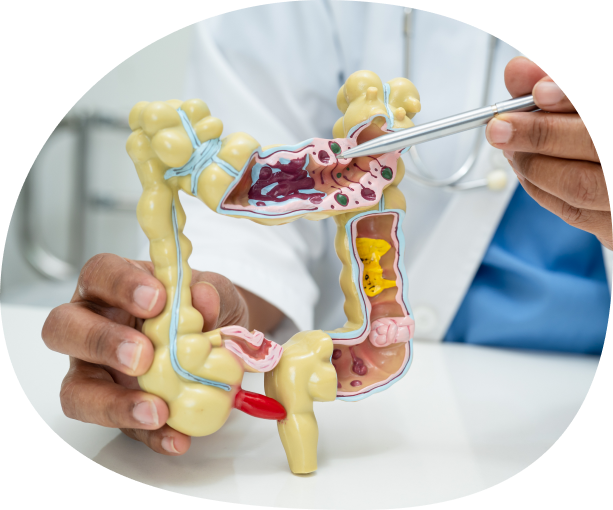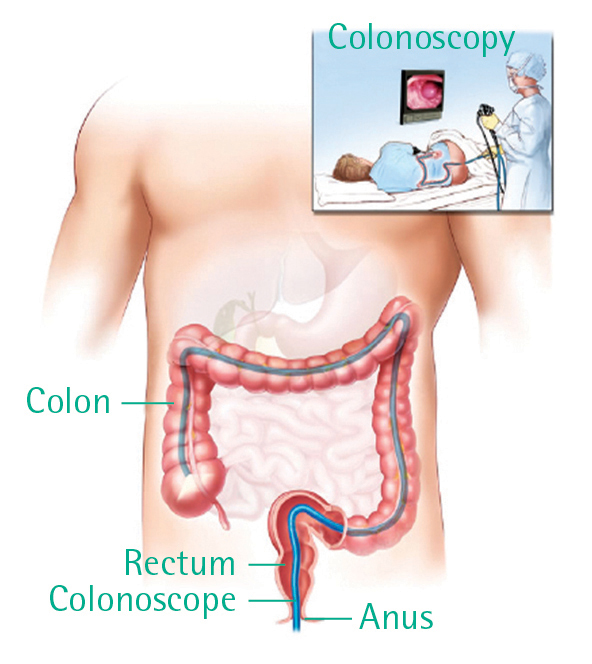Colorectal cancer is the second most common cancer among men and women*. It begins as non-cancerous growths, known as polyps, which can develop into cancer.

The development of polyps into cancer take several years, which means colorectal cancer can be detected early through regular screening. Here are some of the methods used for screening colorectal cancer:
The easiest way to screen for Colorectal Cancer is with a FIT Kit, which begins in your own home. The FIT Kit is able to detect tiny amounts of blood in the stool, which can be a result of bleeding cancers or polyps. If this test detects blood, then other tests will need to be conducted to determine the source of the bleeding.
This involves an examination by a doctor of your rectum and the lower part of your colon with a lighted tube (sigmoidoscope) for polyps.

Using a long lighted tube (colonoscope), your doctor will examine your rectum and your entire colon for polyps.
In this test, special X-ray equipment is used to produce pictures of the colon and the rectum. A computer assembles these pictures into detailed images that can show polyps and other abnormalities.
This procedure involves filling the colon and rectum with a white liquid material (barium) followed by the taking of X-ray pictures. Barium helps to enhance the visibility of any abnormalities, such as polyps.
If you have a symptom or an FIT screening result that suggests bleeding in the gastrointestinal tract, your doctor will need to find out where it originates from by doing a colonoscopy or gastroscopy. If abnormalities such as polyps are found, then a biopsy may be required. Often, the abnormal tissue can be removed during the scope.
If the biopsy reveals that cancer is present, your doctor will follow up to determine the spread of the disease and advise an appropriate treatment plan.
The different stages of colorectal cancer describe how far the disease has spread in the body.
Also known as Carcinoma in situ, this is when the cancer is found only in the innermost lining of the colon or rectum.
The tumour is contained within the inner wall of the colon or rectum.
The tumour has extended more deeply into or through the wall of the colon or rectum. It may have invaded nearby tissue, but cancer cells have not spread to the lymph nodes.
The cancer has spread to nearby lymph nodes, but not to other parts of the body.
The cancer has spread to other parts of the body, such as the liver or the lungs.
Even if the cancer has been treated and eradicated from the body, it can still return after a period of time to the colon or the rectum, or in another part of the body.


Screening is recommended for those aged 50 years and above with no symptoms. For those with a family history of colorectal cancer, screening should begin at an earlier age.
Redeem Colorectal Cancer Screening KitUpon successful application, you should receive the kit in your mail between 7 to 10 working days. If you do not receive it by 14 days, please contact enquiry@pcc.sg.
Enclosed with the FIT kit is a redemption form. It is important that you fill it up legibly and enclose it in the return envelope together with your stool sample. This will enable us to accurately link your sample back to you.
We will notify you through an email within 2 weeks of receiving your sample. We seek your kind understanding as time is needed for mailing, testing, and generating the report.
Please send the sample within 24 hours after retrieval.